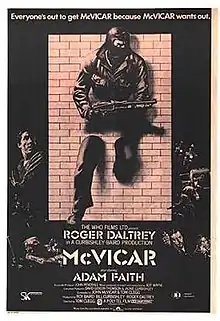McVicar (film)
McVicar is a British drama film released in 1980 by The Who Films, Ltd., starring Roger Daltrey of the Who in the title role of John McVicar.
| McVicar | |
|---|---|
 Film poster | |
| Directed by | Tom Clegg |
| Produced by | Roy Baird Bill Curbishley Roger Daltrey |
| Written by | John McVicar Tom Clegg |
| Starring | Roger Daltrey Adam Faith Cheryl Campbell |
| Music by | Roger Daltrey Various Artists |
| Edited by | Peter Boyle |
Production company | The Who Films Polytel |
| Distributed by | Brent Walker PLC (UK) Crown International Pictures (USA) Universal Pictures (2004, DVD) |
Release date |
|
Running time | 108 minutes |
| Country | United Kingdom |
| Language | English |
| Box office | £717,786 (UK rentals)[1] |
John McVicar was a 1960s armed robber turned writer whom Scotland Yard publicly announced to be Public Enemy Number One and "wanted dead or alive". The film was directed by Tom Clegg, and was based on the non-fiction book McVicar by Himself, which John McVicar wrote to describe several months of his experiences in prison. Bill Curbishley and Roy Baird acted as producers, and the film received a nomination in 1981 for Best Picture at MystFest, the International Mystery Film Festival of Cattolica.
Plot synopsis
The film is set in two halves, the first in Durham prison and the second half while McVicar is on the run in London. The first half of the film focuses on relations between the prison officers and inmates and also McVicar's plotting and eventual prison escape.
Roger Daltrey, lead singer of the British rock group the Who, and 1960s pop star and actor Adam Faith play the two lead roles of John McVicar and Walter Probyn respectively. The supporting cast includes Billy Murray, Brian Hall, Steven Berkoff, Georgina Hale, and Cheryl Campbell as Sheila McVicar.
The latter half of the film is set in London after McVicar has escaped from Durham. Here he re-establishes relationships with his wife and young son and he eventually decides to try to escape from his life of crime by trying to fund a new life in Canada.
Eventually, however, McVicar is forced to fund his family's relocation plan by returning to crime. Soon the Metropolitan Police are hard on his heels and he is eventually recaptured when one of his colleagues in the crime world informs the police officer in charge of McVicar's recapture of his whereabouts.
McVicar is returned to prison and his sentence is increased, but during this time he studies for a BSc in sociology and he is eventually released.
Cast
- Roger Daltrey as John McVicar
- Adam Faith as Walter Probyn
- Cheryl Campbell as Sheila McVicar
- Billy Murray as Joey David
- Georgina Hale as Kate
- Steven Berkoff as Ronnie Harrison
- Brian Hall as Terry Stokes
- Peter Jonfield as Bobby Harris
- Matthew Scurfield as Streaky Jeffries
- Leonard Gregory as Jimmy Collins
- Joe Turner as Panda
- Jeremy Blake as Ronnie Johnson
- Anthony Trent as Tate
- Terence Stuart as Sid
- Harry Fielder as Harry 'Aitch'
- Ian Hendry as Hitchens
- Malcolm Tierney as Frank
- Robert Walker Jr. as Codriver
- James Marcus as Sewell
- Tony Haygarth as Rabies
- Anthony May as Billy
- Charles Cork as Martin
- Paul Kernber
- Stanley Lloyd as Magistrate
- Ronald Herdman as Nobby
- Tony Rohr as Bootsie
- Michael Feast as Cody
- Richard Simpson as Douglas
- Malcolm Terris as Principal Officer
- Ricky Parkinson as Russell McVicar
|
|
Soundtrack
The film's soundtrack, a Roger Daltrey solo album, was released as McVicar and featured contributions by the other three extant members of The Who, Pete Townshend, John Entwistle and Kenney Jones, along with other musicians. The music was conducted by Jeff Wayne. The songs are:
- "Bitter and Twisted", written by Steve Swindells
- "Just a Dream Away", written by Russ Ballard
- "White City Lights", written by Billy Nicholls and Jon Lind
- "Free Me", written by Russ Ballard
- "My Time Is Gonna Come", written by Russ Ballard
- "Waiting for a Friend", written by Billy Nicholls
- "Without Your Love", written by Billy Nicholls
- "McVicar", written by Billy Nicholls
Charts
| Chart (1981) | Peak position |
|---|---|
| Australia (Kent Music Report)[2] | 87 |
See also
References
- "Top Grossing British Films on the U.K. Market: '81-'82". Variety. 12 January 1983. p. 146.
- Kent, David (1993). Australian Chart Book 1970–1992 (illustrated ed.). St Ives, N.S.W.: Australian Chart Book. p. 283. ISBN 0-646-11917-6.